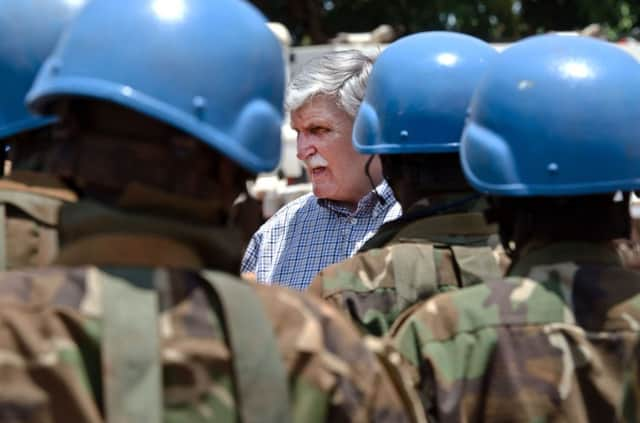The general on a mission to end the use of child soldiers


IT is just over 20 years since the horrific Rwandan genocide.
Between April and June 1994, more than 800,000 ethnic Rwandan Tutsis and moderate Hutus died at the hands of Hutu extremists. The killings only ended that July when the Rwandan Patriotic Front (RPF), a Tutsi-led rebel movement, marched into Kigali and seized control of the country.
Advertisement
Hide AdAdvertisement
Hide AdAs commander of the UN mission in Rwanda, General Romeo Dallaire tried to warn the UN hierarchy about the planned massacre but was denied permission to intervene. He remained in Rwanda through the killing to protect those seeking refuge and has since been credited with saving thousands of lives. It had a profound impact on Dallaire who, having witnessed some of the violence with his own eyes, promised never to let the memory of the Rwandan genocide slip from people’s memory.
It was while in Africa that he first encountered the use of child soldiers, some armed with AK47 rifles. “I am from the Cold War era and child soldiers never entered the equation. But there are countries where children are being picked up and indoctrinated,” he says.
This isn’t a new issue and organisations such as Amnesty International and the UN have been working to end the use of child soldiers in conflicts around the world. The UN has also campaigned to tighten up laws on selling guns to stop them reaching battlefields where child soldiers are fighting.
Even so, it’s estimated there are around 250,000 child soldiers in the world today, with reports of them being involved in war zones in countries like Sudan and the Central African Republic, and even closer to home in Ukraine.
Advertisement
Hide AdAdvertisement
Hide AdDallaire says the way children are being used in wars has changed. “The issue has grown a lot in the last 20 years. There are child soldiers fighting in places like Libya and Syria and with IS and they are being used as a primary weapon of war now.
“Around 40 per cent of these recruits are girls and that is different to how it was in the past.”
Dallaire has served in peacekeeping missions around the globe and tonight he will deliver the annual El Hassan bin Talal Lecture at the University of York, in which he will repeat his calls to end the use of child soldiers.
So how young are we actually talking about? “Easily as young as eight years old, but the bulk of them are aged between 13 and 16,” he says. “The longer they are involved the more disconnected they become from society and the more difficult it becomes to rehabilitate them.”
Advertisement
Hide AdAdvertisement
Hide AdThere’s also the issues of what professional soldiers do when they are confronted with armed children on the battlefield. “There’s no training manual on what to do when faced with a force that uses children as a primary weapon of war.”
Dallaire says the problem is that child soldiers are both victims and a serious security threat, rather than a social and economic problem. “It is not only a massive abuse of human rights, these child soldiers are a significant threat.”
It’s a threat the 68 year-old believes has to be tackled which is why he founded the Child Soldiers Initiative and is a member of the UN Secretary General’s Advisory Committee on Genocide Prevention.
Last year he stepped down from the Canadian Senate in order to spend more time working with The Romeo Dallaire Foundation. “My mission now is to try and influence policy, training and education so that we eradicate the idea of children being used as weapons of war, just as we have done with child labour and child prostitution.”
Tonight’s lecture is at the University of York at 6.30pm. For more details go to http://dallaire-york.eventbrite.co.uk.